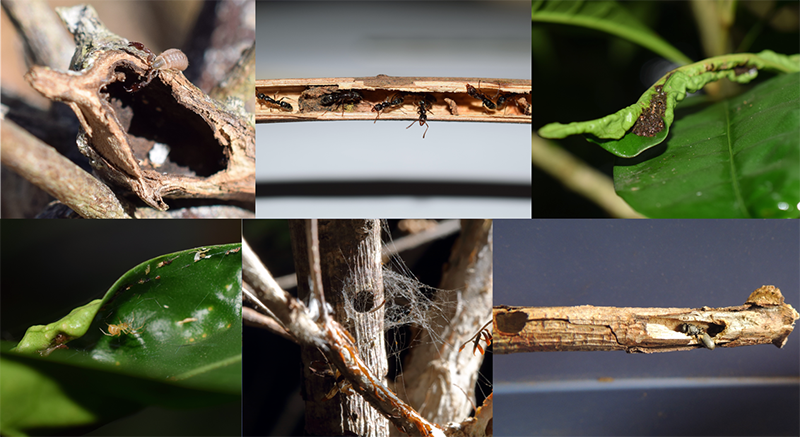








 Dr. Samuel Novais
Dr. Samuel Novais
Investigador Asociado "C"
Investigador Nacional, Nivel I SNI (vigencia 2020-2024)
Doctor en Ecología, UFMG (2018)
Tel (228) 842 18 00 ext. 3317
Esta dirección de correo electrónico está protegida contra spambots. Usted necesita tener Javascript activado para poder verla.
Website: https://snovaisbio.wixsite.com/website
Líneas de investigación
- Estudiar las interacciones antagonistas entre artrópodos herbívoros (folívoros, barrenadores de madera y depredadores de frutos y semillas) y sus plantas hospederas, así como los enemigos naturales asociados que componen el tercer nivel trófico.
- Evaluar los efectos directos e indirectos de artrópodos herbívoros como ingenieros ecosistémicos para otros artrópodos y cómo estos efectos cambian en el espacio y en el tiempo.
Proyectos en desarrollo
- El rol de árboles muertos para la manutención de la diversidad de artrópodos en un bosque de niebla.
- Depredadores de frutos y semillas de tamarindo como ingenieros ecosistémicos en un bosque seco.
- Variación temporal del impacto de la ingeniería ecosistémica por constructores de madrigueras para hormigas león y su parasitismo por moscas en un bosque tropical semideciduo.
Síntesis curricular
Publicaciones: Artículos indizados (24), Notas científicas indizadas (3), Artículos de divulgación (8)
Estudiantes graduados: Licenciatura (1)
Experiencia profesional
Investigador Asociado C. Red de Interacciones Multitróficas, Instituto de Ecología A.C. 01 de octubre 2021 a la fecha.
Formación de recursos humanos
Licenciatura
- Bruna Rodrigues, Charles Rafael Estevão, Naila Petrina Alves, Larissa Nogueira. Efecto del fuego sobre la depredación diferencial de orugas crípticas e aposemáticas en el Cerrado. Ciências Biológicas, Centro Universitário UNA. Minas Gerais, Brasil, 2020.
Publicaciones
2023
- Robinson et al. (many authors including Novais, S.). Plant size, latitude, and phylogeny explain within-population variability in herbivory. Science, 382: 679-683.
- Costa, L. N. P., Novais, S*., Oki, Y., Fernandes, G. W., Borges, M. A. Z. 2023. Mosquito (Diptera: Culicidae) diversity along a rainy season and edge effects in a riparian forest in Southeastern Brazil. Austral Ecology, 48: 41-55.
- Fernandes, G. W., Oki, Y., Negreiros, D., Constantino, R., & Novais, S*. 2023. No short-term effects of fire on termite diversity in a tropical mountain. Insectes Sociaux, 70: 203-2011.
- Freitas, C. D., Novais, S., Santos-Júnior, J. E., Resende, F. M., Oki, Y., Fernandes, G. W. 2023. Distribution patterns of orchid bees in xeric and mesic habitats on a tropical mountaintop. Insect Conservation and Diversity, 16: 658–673.
2022
- Romero, G. Q. (muchos autores incluyendo Novais, S.) et al. 2022. Climate variability and aridity modulate the role of leaf shelters for arthropods: a global experiment. Global Change Biology 28: 3694-3710.
- Novais, S., Hernández-Ortiz, V., Rodríguez-Hernández, K., Quesada, M., Fernandes, G. W., Bañol-Pérez, C., Sánchez-García E. A., Aldaba-Núñez F. A., Méndez-Vázquez L. J., Ochoa M., Zurita-Solís M. A., Aguirre-Jaimes, A. 2022. Local environmental context determines the colonisation of leaf shelters by arthropods: an experimental study. Journal of Tropical Ecology 38, 118-126.
- Pereira, C. C., Novais, S. et al. 2022. Subtle structures with not‐so‐subtle functions: A data set of arthropod constructs and their host plants. Ecology e3639.
- Pereira, C. C., Novais, S., Barbosa, M., Vieira, C., Fernandes, G. W., Romero, G. Q., Cornelissen, T. 2022. Arthropod Constructs and Host Plants. The Bulletin of the Ecological Society of America, 103(2), e01971.
- Monteiro, G. F., Boanares, D., Novais, S., França, M. G., Antonini, Y., Barbosa, M., Oki, Y., Fernandes, G. W. 2022. Imbalance of water potential and photosynthetic efficiency in the parasitic relationship between Struthanthus flexicaulis and Baccharis dracunculifolia. Folia Geobotanica, 57, 71–82.
- Novais, S., Ayala-Sánchez, D., Figueroa-Alvarez, J. A., Aguirre-Jaimes, A., García-Franco, J. G., Quesada, M., & Hernández-Ortiz, V. 2022. Burrow builders as ecosystem engineers for pit-building antlions (Neuroptera: Myrmeleontidae). The Science of Nature, 109(6), 1-6.
2021
- Novais, S., Cristóbal-Pérez, E.J., Aguirre-Jaimes, A., Quesada, M. 2021. Arthropod facilitation mediated by abandoned dead domatia. Ecosphere 12: e03323.
- Rosa, C. (muchos autores incluyendo Novais, S.) et al. The Program for Biodiversity Research in Brazil: The role of regional networks for biodiversity knowledge, dissemination, and conservation. Anais da Academia Brasileira de Ciências 93: e20201604.
2020
- Fernandes, G. W. (muchos autores incluyendo Novais, S. 2020. Biodiversity and ecosystem services in the Campo Rupestre: A road map for the sustainability of the hottest Brazilian biodiversity hotspot. Perspectives in Ecology and Conservation 18: 1-10.
- Monteiro, G. F., Novais, S., Barbosa, M., Antonini, Y., Oliveira Passos, M. F., Fernandes, G. W. 2020. The mistletoe Struthanthus flexicaulis reduces dominance and increases diversity of plants in campo rupestre. Flora 271: 151690.
- Alvarenga, A. S., Silveira, F. A., Santos-Júnior, J. E., *Novais, S. M. A., Quesada, M., Neves, F. S. 2020. Vegetation composition and structure determine wild bee communities in a tropical dry forest. Journal of Insect Conservation 1-12.
- Novais, S., Sáyago, R., Cristóbal-Perez, E. J., Salguero-Hernández, G., Martén-Rodríguez, S., Lopezaraiza-Mikel, M., & Quesada, M. 2020. Anthropogenic and hurricane disturbances had similar negative effects on epiphytic Tillandsia species in a tropical dry forest. Forest Ecology and Management 458: 117797.
- Novais, S., Hernández-Ortiz, V., Rodríguez-Hernández, K., Quesada, M., Valenzuela, J., Fernandes, G. W., Aguirre-Jaimes, A. 2020. Ants nesting in dry fallen petioles of Cecropia obtusifolia Bertol. (Urticaceae): vertical stratification and nest site limitation. Insectes Sociaux 67: 273-279.
- Fernandes, G. W., Rodrigues-Menelau, M. F. V., Almeida, J. S. D., *Novais, S. 2020. Effect of patch size of the exotic host plant Calotropis procera (Apocynaceae) on herbivory. Revista Brasileira de Entomologia 64: e20200021.
- Novais, S., Aguirre-Jaimes, A., Quesada, M., Hernández-Ortiz, V. 2020. Ecosystem engineering by leaf-rolling mites enhances arthropod diversity. The Science of Nature 107: 1-6. IF: 2.427
- Fernandes, G. W., Almeida, J. S., Rodrigues-Menelau, M. F. V., Arantes-Garcia, L., *Novais, S. 2020. The bigger the better? Vigour of the exotic host plant Calotropis procera (Apocynaceae) affects herbivory. Neotropical Biology and Conservation 15: 359-366.
2019
- Almeida, H. A., Monteiro, G. F., Freitas C. D., Novais, S., Fernandes, G. W. 2019. Efeito do dimorfismo sexual em Neea theifera Oerst. (Nyctaginaceae). MG. BIOTA 11: 42-52.
- *Novais, S. M. A., Monteiro, G. F., Macedo-Reis, L. E., Leal, C. R. O., Neves, F. S. 2019. Changes in the insect herbivore fauna after the first rains in a tropical dry forest. Oecologia Australis 23: 382-387.
2018
- Novais, S., Macedo-Reis, L. E., Cristobal-Peréz, E. J., Sánchez-Montoya, G., Janda, M., Neves, F., Quesada, M. 2018. Positive effects of the catastrophic Hurricane Patricia on insect communities. Scientific Reports 8: 1-9.
- Novais, S., Calderón-Cortés, N., Sánchez-Montoya, G., Quesada, M. 2018. Arthropod facilitation by wood-boring beetles: spatio-temporal distribution mediated by a twig-girdler ecosystem engineer. Journal of Insect Science 18: 1-7.
2017
- *Novais, S., Macedo-Reis, L. E., Neves, F. S. 2017. Predatory beetles in cacao agroforestry systems in Brazilian Atlantic forest: a test of the natural enemy hypothesis. Agroforestry Systems 91: 201-209.
- Novais, S., DaRocha, W. D., Calderon-Cortes, N., Quesada, M. 2017. Wood-boring beetles promote ant nest cavities: extended effects of a twig-girdler ecosystem engineer. Basic and Applied Ecology 24: 53-59.
2016
- *Novais, S., Evangelista, L. A., Reis-Júnior, R., Neves, F. S. 2016. How does dung beetle (Coleoptera: Scarabaeidae) diversity vary along a rainy season in a tropical dry forest?. Journal of Insect Science 81: 1-6.
- *Novais, S., Macedo-Reis, L. E., DaRocha, W. D., Neves, F. S. 2016. Effects of habitat management on different feeding guilds of herbivorous insects in cacao agroforestry systems. Revista de Biologia Tropical 64: 763-777.
- *Novais, S., Nunes, C. A., Santos, N. B., DAmico, A. R., Fernandes, G. W., Quesada, M., Braga, R. F., Neves, A. C. O. 2016. Effects of a possible pollinator crisis on food crop production in Brazil. PLoS One 11: e0167292.
- Macedo-Reis, L. E., Novais, S. M. A., Monteiro, G. F., Flechtmann, C. A. H., Faria, M. L. D., Neves, F. S. 2016. Spatio-temporal distribution of bark and ambrosia beetles in a Brazilian tropical dry forest. Journal of Insect Science 48: 1-9.
2015
- *Novais, S., Alvarenga, A. S., Falcão, L. A. D., & Neves, F. S. 2015. Vertical stratification and effect of petiole and dry leaf size on arthropod feeding guilds in Cecropia pachystachya (Urticaceae). Brazilian Journal of Biology 75: 517-523.
Espacio personal


 CV en extenso
CV en extenso